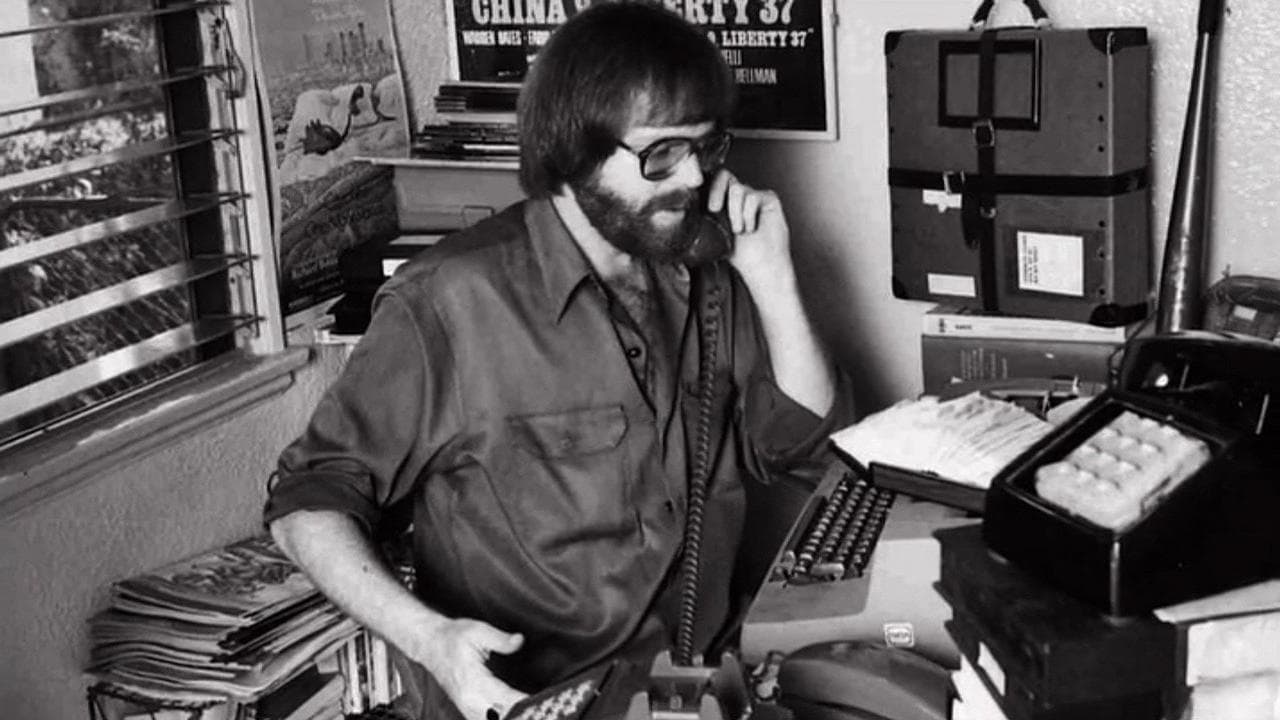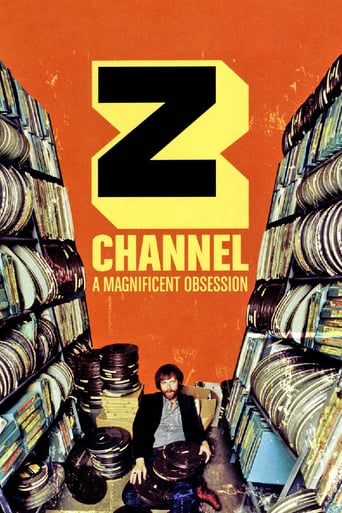

There were a slew of "films" (read "DV documentaries") about the movies of the 1970's released around the time of Z Channel: A Magnificent Obsession. One patting Francis Coppola, William Friedkin etc on the back repeatedly before insisting "Hey dude, have you seen The Godfather, or Taxi Driver?" Whilst I forget the name of said "documentary", it was pointless and made me bored and angry. Z Channel on t'other hand, is a genuinely interesting and insightful documentary which was lost amongst the dirge. How ironic.The daughter of John Cassavetes interviews both over-enthusiastic notables (Tarantino), notable bores (Jim Jarmusch) and people you've never heard of in front of her DV video camera. Each explains the significance of a regional cable channel in LA, and how one man's complaint about the quality of programming led to the modern age of DVD audio commentaries on Italian art films which wouldn't been seen in the English speaking world otherwise.Alexandra Cassavetes charts the rise and fall of a channel which filled the gap before Criterion Collection DVDs. Treating subscribers to a potpourri of exploitation, documentary and classic art films they had never seen before. To quote one interviewee, films "which people wouldn't have gone to see if they were free!" were beaming direct to people's living rooms, commercial free. And one obsessive film fan is to thank. A Mr. Jerry Harvey.Because the cutting and pace of this doco is full speed ahead, it quickly glosses over the pre-Jerry years of the channel (it had been active since the '70s as one of the first cable channels, Jerry became programmer in 1980) to run the parallel story of the troubled mind of this largely self-taught film "genius". Considering he was only one man, he was able to do a hell of a lot in a very short space of time. As chief programmer for THE cable channel in THE entertainment hub of THE universe, he brought films which had been overlooked to the Academy's attention (aiding directly in the Oscar recognition for Salvador), and in other instances changed the reputation of films from 'flop' to 'classic' by running them at their original length, effectively inventing the "Director's Cut", and giving the kiss of life to films like The Wild Bunch, Heaven's Gate, Once upon a Time in America, 1900 and The Leopard.Alexandra walks us through his many marriages and his troubled family life by use of a radio interview and slow 8mm scenes of Hollywood, which will either work or won't depending on your disposition. She makes sophomoric mistakes along the way, an interview with Penelope Spheeris about the punk classic, The Decline of Western Civilization, has little to do with Z Channel. They did screen it, but the discussion fails to shed light on either the film or Z Channel's involvement, and along with the many nude scenes from other films, seems in place only to break up all the talking.Admittedly hearing Jim Jarmusch discuss L'avventura left ejaculate on the hem of my panties, and I wished the entire film could have been like that - More Paul Verhoeven, please - but this is a split between film buffery and the sober Jerry Harvey allegory. Z Channel it seems, died with Jerry. After successfully fighting off competition from HBO and Showtime, Jerry succumbed to personal demons, as the channel introduced sport, and thus commercial, content. As one interviewee has it, during a screening of The Silence, a film about the quest for God ("what's at the end, is it God or silence") the climax was ruined by a promo for an upcoming sporting event.
... View MoreIt's true. The question can be asked: Is it a film about an early cable TV mad genius impresario, or the station's impact on the film & cable industry, or simply an exposure and homage to the kind of films that brought the man and his Channel Z their well deserved success.Of course it is all of the above and thank god for it.Probably about as good a treatment of the subjects as you could ask for. Studios & "suits" are the bad guys. Film critics are almost as bad. But for those that love the art of film, like these people do, we can join in the celebration. I was never that impressed with the films of Sam Peckinpaw, but now I must take another look. Six hours of Das Boot? Now I know why.It's also an instructional story of marketing. How to find a niche. How to defy conventional wisdom and find the "uncommon denominator" that brings success. Is there a market for this or that? There is always a market for things that are produced by people simply following their passion.
... View MoreWatching this extremely interesting, informative and captivating documentary made me jealous of what films were available to LA viewers back in 70s and 80s on the Z Channel, the first American pay-cable station before HBO or Showtime: from Altman's "McCabe and Mrs. Miller" and "Images" to Fellini, to Tarkovsky's "Andrei Rublyov", to Kurosawa's films, to Antonioni's festival, to the full 15 1/2 hours Fassbinder's "Berlin Alexanderplatz", to the restored full version of Michael Cimino's "Heaven's Gate", to the director's cut of Leone's "Once Upon a Time in America", to Bertolucci's "1900", the 5 hours version. The man behind it, Jerry Harvey was a visionary and a great lover of the European and Independent movies and many famous filmmakers (Robert Altman, Jacqueline Bisset , Jim Jarmusch, Theresa Russell and many more), critics, and former co-workers as well as his first wife and his long-time girlfriend pay their tribute to him and his legacy in the documentary. They share the memories of a channel that had brought the great and unavailable anywhere else films that influenced the new generation of filmmakers, Alexander Payne and Quentin Tarantino are just two names among many. The stories of Jerry Harvey are inter-cut by the clips from the great movies that were first available to the lucky subscribers of the Z Channel. I can't resist in naming few more: "Les Enfants du paradis" (1945) aka "Children of Paradise", "Il Gattopardo" (1963) aka "The Leopard", "Fitccarraldo" (1982) , "Path of Glory", "Turkish Delight" (1973), L'Avventura, (1960), "Professione: reporter" (1975), "La Notte" (1961), "Les Quatre cents coups" (1959) aka "400 Blows" , "Tystnaden" (1963) aka "The Silence", "Le Magnifique" (1973) aka "The Magnificent".James Woods remembers how much he enjoyed working with Oliver Stone on the movie "Salvador" (1986) and he thinks of the role of Richard Boyle, the journalist whose book the films was based on as his best acting achievement. The film was a flop and was pulled from the theaters in two weeks. Jerry Harvey offered to show it on the Z Channel and it ran there for over a month. The next thing, Woods recalls - the movie received two Academy Awards nominations for the Best Actor in a Leading Role for him and for Best Writing, Screenplay Written Directly for the Screen for Stone and Boyle. Woods is sure that it would not have been possible without Z Channel because nobody would see "Salvador".Thanks to the documentary, I was able to recognize the movie that I saw many years ago in Moscow and still remember well, I could not only recall the title. I remember that the movie was Dutch, very erotic in the raw, brutal, twisted yet beautiful and passionate way. Watching "Z Channel.." last night, I was happy to instantly recognize "Turks fruit" (1973) aka "Turkish Delight" made by Paul Verhoeven in 1973. There are not very many directors in the world that can create the atmosphere of raw sensuality as well as Verhoeven (of his Dutch period, especially). I am going to try to find "Turkish Delight" and see it again.The film does not hide the dark side of Harvey who with two sisters was raised by the fundamental catholic father in a strict house. One of his sisters has committed suicide and the other vanished (more likely she took her own life, also). Harvey described his childhood as a cross between "American Graffiti" and "Two Lane Blacktop". For many years, Harvey had fought his mental conditions but in the end, he could not cope with the problems, external - pertaining to selling Z Channel to a company that tried to combine films with sports programming and mental that had always been the part of his life. In April 1988 , Harvey shot to death his second wife Deri Rudolf with the gun who was presented to him by his long time friend, Sam Pekinpah. Then, he killed himself.Controversial and disturbed, fiercely intelligent, madly in love with the films but sadly having lost the battle to the demons of depression, Harvey's will be remembered for bringing to the viewers the films in their "Director's Cut" and the best foreign and independent films.In the conclusion I want to mention that the movie was made by Alexandra ("Xan") Cassavetes, the daughter of John Cassavetes, the Godfather of American Independent film-making and his muse Gena Rowlands.
... View MoreVery important tribute to a vital part of movie history. Very well researched. Narration is excellent. Would have liked to see more explanation of the maverick side of the operation, how important it was to all film makers. But overall, very well done. Recommmend to anyone interested in independent films and film in general. Makes me wish I was a subscriber. Also points out, how commercialism eventually ruins all. This is my first review. Why in the heck is there a minimum number of lines? Do we all have to be long winded and pedantic in this world? I was done in two lines, but am forced to write 10. Well, I am almost at 10, so I hope you watch this enjoyable documentary.
... View More